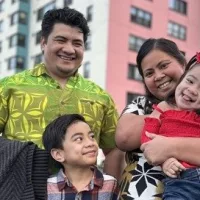
Right to Democracy, the nonprofit organization that defends the rights of people from U.S. territories, says Alaska should fix the problem, not put American Samoans in jail.
It says in a statement that American Samoans in Alaska are being criminally targeted based on confusion related to Alaska’s election administration system and because they are labeled as so-called “non-citizen” U.S. Nationals by the federal government.
On Friday, May 2nd, ten American Samoans will be arraigned in Anchorage after receiving summonses on charges of perjury, voter misconduct, and other alleged offenses related to their birth in American Samoa. The charges follow a large-scale police raid last September in which two dozen Alaska State Troopers descended in unmarked vehicles on the small town of Whittier, Alaska (population 250), interrogating Michael Pese and other American Samoan residents at their homes, places of work, and even in the street about their “immigration status” and voting records. In 2023, Alaska State Troopers arrested Pese’s wife, Tupe Smith, who was also born in American Samoa, handcuffing her at home in front of her children after she won election to her local school board with 96% of the vote. The most serious charges could mean up to ten years in jail.
Michael Pese, who has served as a volunteer firefighter in Whittier, expressed shock at how the State of Alaska is targeting the American Samoan community: “We have gone from feeling like valued members of the community to feeling like unwanted criminals.”
Tupe Smith remains traumatized by her arrest, recalling how her two young children cried as she was being handcuffed, the embarrassment of Alaska State Troopers marching her out of the apartment building where nearly all of Whittier’s residents live, and the shame of being strip-searched and forced to wear a prison uniform: “This was the lowest point of my life. I never thought I would go through something like this. Had Alaska issued me a summons like they did my husband and other family members, I would have shown up in court. There was no need to handcuff me in front of my kids.”
Neil Weare, Co-Director of Right to Democracy, and American Samoa attorney Charles Alailima are part of the legal team defending Smith. Weare said, “Idiosyncrasies in Alaska law and the ambiguous nature of so-called ‘non-citizen’ U.S. national status mean public officials in Alaska have often sent contradictory messages to American Samoans about their eligibility to vote.”
Like all Alaska residents, American Samoans are eligible to apply for Alaska’s Permanent Fund Dividend (PFD), an annual cash payment made to residents of the state. Once they apply, they are often automatically registered to vote – even when they indicate they are not a U.S. citizen and make clear they are a U.S. national only. Once registered, Alaska sends them a voter registration card and reminders to vote. Alaska law also defines “United States citizen” to include “nationals from American Samoa” for the purpose of certain state welfare benefits, but does not recognize them as U.S. citizens for other benefits.
Alailima said, “When American Samoans move to Alaska – or really any state – it is often unclear what rights they do and do not enjoy. Most understand that when they are no longer residents of American Samoa, they can no longer vote there. But many have the impression that once they establish residency in a state, they can vote in state and local elections, just not federal ones.”
Ala’ilima added, “Because American Samoans carry a U.S. passport, many public officials in Alaska might assume they are U.S. citizens. As a result, many American Samoans report being told by state and local officials that they are, in fact, eligible to vote. When American Samoans ask which box to check on voter registration and other forms, people report that public officials often instructed them to select the box indicating they are a U.S. citizen when there is no box for ‘U.S. National.’ Some elected officials in Alaska have even organized ‘Get-Out-The-Vote’ campaigns encouraging the American Samoan community to register and vote.”
The new charges filed by Alaska came just two months after the Alaska Court of Appeals granted review of an Alaska Superior Court decision concluding that for Alaska to prove voter misconduct, it did not matter that “Ms. Smith may have thought she could vote for state elections” or that “a voting official may have given her incorrect information,” even as it noted it was “sympathetic towards the confusing nature of the PFD automatic voter registration, the lack of voting-right information regarding U.S. nationals, and navigating rights as a U.S. national.” The Court of Appeals is now considering whether Alaska is required to prove that someone accused of voter misconduct “intended to mislead or deceive a public official.”
Alaska prosecutors also explained in their recent charging documents that the reason investigators targeted American Samoans in Whittier was because voting records showed their “identified place of birth was outside of the United States.”
“Whether American Samoa is ‘outside of the United States’ or ‘in the United States’ is the key question – it is the difference between having a constitutional right to be recognized as a U.S. citizen and not having such a right,” said Mr. Ala’ilima. “The answer should be clear – American Samoa has been a territory of the United States since the early 1900s. Six generations born in American Samoa have owed their allegiance at birth to the United States of America. Generations of American Samoa’s sons and daughters confirmed their allegiance through their service in the U.S. Armed Forces at higher rates than any state.”
Photo: Michael Pese, Tupe Smith, and their children in Whittier, Alaska/Right to Democracy



